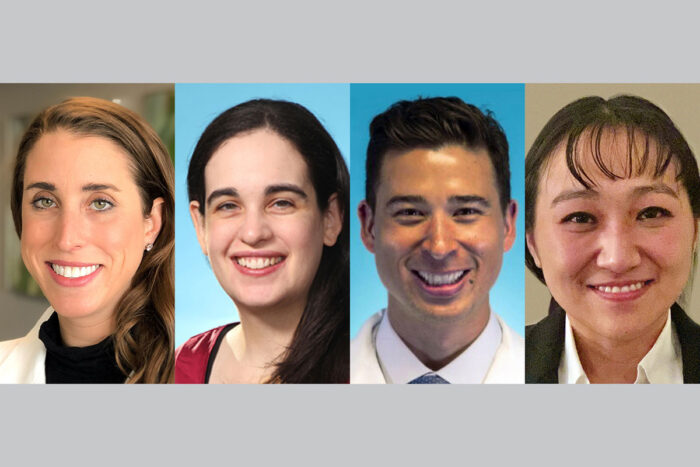4 physician-scientists named Dean’s Scholars
Program supports doctors who want to conduct basic science research
 Washington University
Washington UniversityThe Division of Physician-Scientists at Washington University School of Medicine in St. Louis has named its second class of physicians for the Dean’s Scholars Program. The awardees will receive up to two years of financial support and mentorship, as well as dedicated lab time to conduct scientific research. The four physicians (from left) are: Mary “Maggie” Mullen, Erica Young, Matthew Shew, and Rong Mei Zhang.
The Division of Physician-Scientists at Washington University School of Medicine in St. Louis has selected four physicians for its second class of Dean’s Scholars. The program provides up to two years of financial support and mentorship to aspiring, early-career physician-scientists, along with dedicated time for conducting laboratory research.
The newly named class includes: Mary “Maggie” Mullen, MD; Matthew Shew, MD; Erica Young, MD; and Rong Mei Zhang, MD.
Initiated in 2020, the program represents the school’s commitment to address a nationwide shortage of physician-scientists by nurturing the career development of physicians who treat patients but also want to pursue laboratory-based biomedical research.
Physician-scientists are considered crucial to developing new therapeutics and approaches to diagnosing and treating disease. However, their numbers are dwindling. While many physician-scientists hold medical and doctoral degrees, the Dean’s Scholars program aims to strengthen the research skills of those who have earned only medical degrees.
“The Dean’s Scholars program is a testament to how important it is for the School of Medicine to mold and mentor talented physician-researchers,” said David H. Perlmutter, MD, executive vice chancellor for medical affairs, the George and Carol Bauer Dean of the School of Medicine, and the Spencer T. and Ann W. Olin Distinguished Professor. “Our Dean’s Scholars have proven themselves as excellent physicians who also demonstrate promise in basic scientific research. As we look at the future, we want our training programs to be supporting and promoting excellence for all kinds of careers, including physician-scientists as a part of this Dean’s Scholars program but also careers as dedicated clinicians, dedicated educators and entrepreneurs.”
The program is supported with a Physician-Scientist Institutional Award from the Burroughs Wellcome Fund — a nonprofit organization that supports biomedical science through research and education. The School of Medicine and its departments also provide financial support for the program.
The four new Dean’s Scholars underwent a competitive application process that required interviews with senior faculty and presentations of their proposed research projects.
Mullen is a fellow in gynecologic oncology in the Center for Reproductive Health Sciences. Her research will focus on ovarian cancer resistance to chemotherapy, and developing new therapies. To do this, she will examine the effects of chemotherapy drugs on tumor DNA. Her mentor is Katherine Fuh, MD, PhD, an associate professor of obstetrics & gynecology.
Shew, a neurotology fellow, will aim to use machine learning, a type of artificial intelligence, to help predict speech perception performance in patients with severe to profound hearing loss who have received cochlear implants. Currently, no accurate methods exist to help predict cochlear implant performance after implantation. His mentor is Craig Buchman, MD, the Lindburg Professor and head of the Department of Otolaryngology — Head & Neck Surgery.
Young, a postdoctoral research fellow in the Cardiovascular Division, will focus on genetic risk factors of coronary artery disease, which is the leading cause of death worldwide. However, unlike previous studies that have primarily examined people of European descent, Young’s research will analyze whole genome sequencing from multi-ethnic populations. Her mentor is Nathan Stitziel, MD, PhD, an associate professor of medicine and genetics in the Cardiovascular Division.
Zhang, an instructor in the Division of Endocrinology, Metabolism & Lipid Research, aims to investigate the impact of acute hyperglycemia on metabolism and the immune system. This is part of her larger goal to examine the role of immune cells in diabetic complications that result in kidney disease, as well as to find more effective therapies to treat the disease’s progression. Her mentor is Carlos Bernal-Mizrachi, MD, a professor of medicine and head of medicine at the Veterans Affairs St. Louis Health Care System, which is affiliated with the School of Medicine.
“Our medical school is brimming with brilliant physician-scientists, not all of whom have MD/PhD degrees,” said Wayne M. Yokoyama, MD, an associate dean, director of the Division of Physician-Scientists, and the Sam J. Levin and Audrey Loew Levin Professor of Arthritis Research.
Yokoyama himself is internationally recognized for his research on a type of immune cell called natural killer cells. “As an MD-only physician-scientist myself, I understand the unique challenges that this career path presents,” he said. “Our goal is to support our doctors in training financially and with protected time and mentorship so that they can persevere beyond those challenges.”







